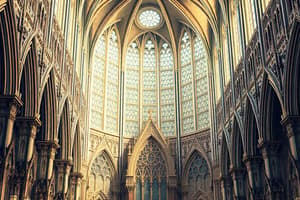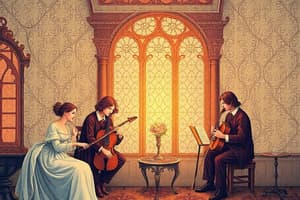Podcast
Questions and Answers
What is a defining characteristic of Renaissance music?
What is a defining characteristic of Renaissance music?
- It utilizes electronic instruments.
- It features heavy improvisation.
- It is primarily monophonic.
- It is mostly polyphonic. (correct)
Which of the following best describes the genre 'Mass' in Renaissance music?
Which of the following best describes the genre 'Mass' in Renaissance music?
- A form of sacred musical composition. (correct)
- Traditional folk music from rural communities.
- Instrumental music designed for theatrical performances.
- Secular music performed for entertainment.
Who was Thomas Morley recognized for?
Who was Thomas Morley recognized for?
- His contributions to secular music. (correct)
- His work on polyphonic instrumental compositions.
- His innovations in electronic music.
- His compositions for church music.
Which instrument was predominantly featured in Renaissance music?
Which instrument was predominantly featured in Renaissance music?
Which of the following is NOT a main section of the Mass?
Which of the following is NOT a main section of the Mass?
What does 'word painting' in Renaissance music refer to?
What does 'word painting' in Renaissance music refer to?
In Renaissance music, what is meant by the term 'a cappella'?
In Renaissance music, what is meant by the term 'a cappella'?
What was one significant historical discovery made during the Renaissance?
What was one significant historical discovery made during the Renaissance?
What does the term 'Fugue' translate to in English?
What does the term 'Fugue' translate to in English?
Which of the following is a characteristic of Baroque music?
Which of the following is a characteristic of Baroque music?
Which term best describes the musical texture primarily associated with the Medieval period?
Which term best describes the musical texture primarily associated with the Medieval period?
Which musician is associated with the Baroque period?
Which musician is associated with the Baroque period?
The discovery of what led to the wide distribution of Renaissance compositions?
The discovery of what led to the wide distribution of Renaissance compositions?
What is a characteristic feature of a fugue?
What is a characteristic feature of a fugue?
What musical term describes a narration based on biblical subjects in the context of Baroque music?
What musical term describes a narration based on biblical subjects in the context of Baroque music?
Which of the following composers is NOT mentioned as a famous Baroque composer?
Which of the following composers is NOT mentioned as a famous Baroque composer?
Which statement is true regarding the dynamics in Baroque music?
Which statement is true regarding the dynamics in Baroque music?
Which of the following terms is NOT associated with the Baroque period?
Which of the following terms is NOT associated with the Baroque period?
What is the primary purpose of an oratorio?
What is the primary purpose of an oratorio?
How did Johann Sebastian Bach's early life impact his music career?
How did Johann Sebastian Bach's early life impact his music career?
In what language are oratorios typically written?
In what language are oratorios typically written?
Which of the following best describes a chorale?
Which of the following best describes a chorale?
What is the main theme in a fugue referred to as?
What is the main theme in a fugue referred to as?
What distinguishes the concerto grosso from other musical forms?
What distinguishes the concerto grosso from other musical forms?
Which instrument is predominantly featured in Vivaldi's compositions?
Which instrument is predominantly featured in Vivaldi's compositions?
What is the title of Vivaldi's most famous composition?
What is the title of Vivaldi's most famous composition?
Which of the following works is NOT attributed to Johann Sebastian Bach?
Which of the following works is NOT attributed to Johann Sebastian Bach?
Where did George Friedrich Händel primarily gain his music education?
Where did George Friedrich Händel primarily gain his music education?
What nickname was given to Antonio Vivaldi due to his appearance?
What nickname was given to Antonio Vivaldi due to his appearance?
What is notable about the structure of Vivaldi's The Four Seasons?
What is notable about the structure of Vivaldi's The Four Seasons?
What form of musical composition is Händel particularly remembered for?
What form of musical composition is Händel particularly remembered for?
What role did Johann Sebastian Bach serve at St. Thomas Church?
What role did Johann Sebastian Bach serve at St. Thomas Church?
Which composer is primarily associated with the Golden Age of Polyphony?
Which composer is primarily associated with the Golden Age of Polyphony?
What is a characteristic feature of a Madrigal?
What is a characteristic feature of a Madrigal?
Which of the following best describes a Motet?
Which of the following best describes a Motet?
What does the term 'Chorale' refer to in the context of music?
What does the term 'Chorale' refer to in the context of music?
Which musical form combines two or more independent melodies?
Which musical form combines two or more independent melodies?
Which of the following composers is NOT associated with the development of Vocal Polyphony?
Which of the following composers is NOT associated with the development of Vocal Polyphony?
Which term is used to describe a solo song accompanied by instrumental music, popular in the Renaissance?
Which term is used to describe a solo song accompanied by instrumental music, popular in the Renaissance?
What distinguishes the Golden Age of Acapella from other musical periods?
What distinguishes the Golden Age of Acapella from other musical periods?
Flashcards are hidden until you start studying
Study Notes
Characteristics of Renaissance Music
- Predominantly polyphonic with multiple independent melodies.
- Common use of imitation among vocal lines, enhancing musical texture.
- Word painting techniques reflect the meaning of lyrics in the music.
- Melodic lines characterized by flowing movement; easier to perform with minimal large leaps.
- Mass: Sacred polyphonic compositions for the Eucharistic liturgy, performed a cappella or with orchestration. Key sections: Kyrie, Gloria, Credo, Sanctus, Agnus Dei.
- Madrigal: Secular songs performed at social gatherings.
Notable Composers
- Giovanni Pierluigi da Palestrina excelled in church music; Thomas Morley in secular.
Popular Instruments
- The lute, an early form of the guitar, was a significant instrument in Renaissance music.
The Renaissance Era
- Spanning from the 14th to 16th centuries, originating in Italy.
- Marked as a "Golden Age of A Cappella" music.
- Key historical advancements encompass Copernicus's solar system discovery, compass invention, printing press development, and Martin Luther's Reformation influence.
Vocal Music of the Renaissance Period
- Fugue: A complex contrapuntal piece typically written in three or four parts with a principal theme called the "subject."
- Oratorio: Large-scale musical works for orchestra and voices, often religious, performed without costumes or scenery.
Characteristics of Baroque Music
- Monophonic texture contrasted with the use of polyphony.
- Known for dynamic contrasts and exaggerated motion.
- Chorales are harmonized hymns resembling Protestant church music.
Famous Baroque Composers
- Johann Sebastian Bach: Renowned for sacred music, oratorios, and instrumental compositions, including the "Brandenburg Concertos" and "Toccata and Fugue in D minor."
- Antonio Vivaldi: Celebrated for violin concertos, particularly "The Four Seasons," depicting seasonal changes.
- George Friedrich Händel: Acclaimed for operas and oratorios, earned fame for works like "Messiah."
Key Terms and Concepts
- Polyphony: Music with multiple independent melodies.
- Mass: Musical settings of the Eucharistic liturgy.
- Fugue: Work structured around a central theme developed through contrapuntal techniques.
- Oratorio: A narrative-based performance work that features orchestras and choirs.
Noteworthy Musical Works
- Vivaldi's "The Four Seasons" and Bach's "Mass in B minor."
- Händel’s oratorios such as "Messiah."
- Must listen to significant pieces for experiential understanding.
Summary of Musical Periods
- Medieval, Renaissance, and Baroque music exhibit distinct stylistic traits, each contributing to the musical evolution through different genres and forms.
Studying That Suits You
Use AI to generate personalized quizzes and flashcards to suit your learning preferences.




